The argument for when is the best time to begin drawing your social security benefits has become heated lately. The reason for this is that an individual’s circumstances have so much to do with making an informed decision. For some, taking your benefits as early as possible makes sense and for others, waiting is the better option. Here, we’ll shed some light on both sides of the argument and offer legitimate reasons why a retiree should go one way or the other and answer the question: “When should I take my Social Security benefits?”
Taking Your Benefits Early
Once again, your particular circumstances should be the deciding factor, so we’ve listed below some common scenarios where earlier is likely better than later.
Health Issues
If at age 62 (the earliest benefit age for most people) you have some major health issues and do not expect to live past 75 or 80, taking your benefits early may be the better way to go, even with the 25% hit you’ll take for starting early.
Forced Retirement
If you’ve been employed at a company that is looking to downsize and are offering forced retirement packages, you’ll likely need to take your benefits sooner rather than later, especially if you have little to no savings.
Lack of Faith in the System
Because of negative news stories about the social security retirement fund and ambiguous claims of entitlement reform that would likely affect recipients, many people are taking their benefits at age 62 because they do not trust the government and have a lack of faith that the system will survive.
I’ll Invest the Money and Do Better than Uncle Sam
There’s a large crowd out there that believe they can take early benefits at age 62 and invest the reduced monthly benefit and still do better than waiting until full retirement age or later. This may have been true back in the day when earning 10 to 12% on your money was fairly common, but not now. In today’s economy, you’d be doing well if you earned a steady 6 or 7%. In this case, the math just doesn’t add up to overcome the 25% hit.
These four examples may win the argument in your mind over taking the money and running but let’s be clear about this, a fairly recent survey conducted by the Nationwide Financial Retirement Institute found that 23 percent of people who drew early Social Security benefits regretted their decision to do so.
Taking Your Benefits at Full Retirement Age or Later

Many financial planners today are adamant about waiting as long as possible before starting your withdrawals and the numbers provided by Social Security support this (as long as you can wait).
For the sake of this argument, let’s check out a hypothetical person whose work history has them getting $2,000 per month (PIA) at the full retirement age of 66-years old (born between 1943 and 1954).
| AGE 62 | AGE 63 | AGE 64 | AGE 65 | AGE 66 | AGE 67 | AGE 68 | AGE 69 | AGE 70 |
| $1,500 | $1,600 | $1,733 | $1,867 | $2,000 | $2,160 | $2,320 | $2,480 | $2,640 |
| -25% | -20% | -13.3% | -6.67% | 100% | +8% | +16% | +24% | +32% |
Annual benefit by age without regard to COLA (cost of living adjustment)
| AGE 62 | AGE 63 | AGE 64 | AGE 65 | AGE 66 | AGE 67 | AGE 68 | AGE 69 | AGE 70 |
| $18,000 | $19,200 | $20,796 | $22,404 | $24,000 | $25,920 | $27,840 | $29,760 | $31,680 |
You are Still Working
If you continue to work past age 66 and are living comfortably on your income, it makes a lot of sense to put off taking your benefits past age past age 67. Each year you wait amounts to 8% more annual income for your retirement (if you ever retire).
Minimal Savings
Folks need to remember that Social Security was never designed to be your only retirement income. It is supposed to supplement your life savings or other retirement plans you have invested in. If your savings is lackluster like many other workers in America, or if you haven’t invested in some other retirement vehicle, you should wait as long as financially possible before you pull the trigger.
Your Spouse’s Benefit is Much Lower
Certainly, sharing your golden years with a loving spouse makes your retirement dream even more passionate. But what if your spouse’s retirement benefit is not enough to sustain that dream? If one or even both of you can put off drawing your Social Security benefits until after your full retirement age, the 8% increase can make a world of difference.
The Bottom Line – When Should I Take my Social Security?
When it comes to making financial decisions, “rule of thumb” is useless to go by. Every person or couple have individual  circumstances and needs and their decision must be based on them. When you should take your Social Security benefits depends on where you are financially at age 61 and what your expectations are going forward. Taking your benefits early can be a godsend because of your situation, or it could be a substantial financial mistake if you didn’t take all factors into consideration.
circumstances and needs and their decision must be based on them. When you should take your Social Security benefits depends on where you are financially at age 61 and what your expectations are going forward. Taking your benefits early can be a godsend because of your situation, or it could be a substantial financial mistake if you didn’t take all factors into consideration.
Always, always, always do substantial research on the subject. This doesn’t mean finding the first internet article you agree with. It means taking into consideration the various viewpoints on the subject along with your financial circumstances and your desired expectations. Speak with an experienced and reputable professional who will help you look at your situation from every side and then make an informed decision about YOUR SOCIAL SECURITY BENEFITS.

 Speak with an experienced advisor!
Speak with an experienced advisor!